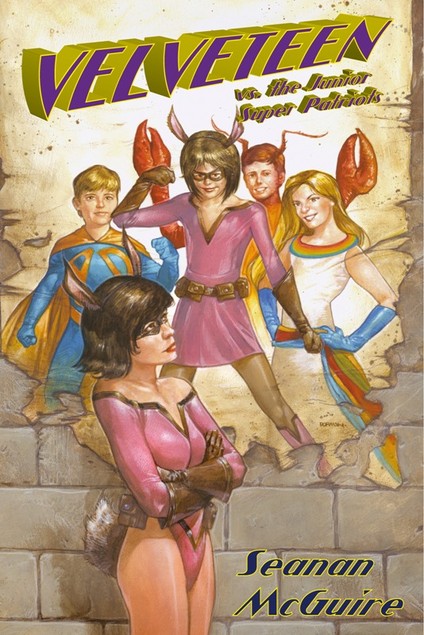I don’t want to deny Gavia Baker-Whitelaw her experiences and LonCon3 wasn’t perfect, but this is just not true:
In order to truly enjoy Worldcon, you had to be one of three things: someone with a ton of old friends at the convention, a serious sci-fi/fantasy literature fan who wanted to get some books signed and sit in on academic panels, or a writer who wanted to network with other people in the industry. Being a Baby Boomer would also help a lot.
If you were a newcomer attending Worldcon by yourself, or if you were used to the kind of fandom that focuses on things like racebent fanart, slash fanfic, and intelligent pop-culture critique, then you weren’t going to have much fun. Which is pretty sad, because these two interest groups are not separate monoliths. Plenty of die-hard Supernatural and Avengers fans also read Tolkien and Neal Stephenson, and plenty of academic sci-fi/fantasy fans also like to dress up as anime characters. Unfortunately, while Nine Worlds seemed to understand this, Worldcon—or the people who regularly attend Worldcon—did not.
There were cosplayers, even Supernatural cosplayers (and I should know, because I registered one) and from what I could see they were neither disparaged nor harassed, there were plenty of programmes about what used to be called media science fiction as well as an entire stream of transformative fandom items that would’ve fitted just as well at Nine Worlds, there were plenty of people able and willing to talk about everything Gavia Baker-Whitelaw mentions. There were also plenty of people who went to both Nine Worlds and LonCon3 and had a great time at both.
Of course she does have a point about some people’s reaction to anything that isn’t old skool fandom, the attitude of certain longtime fans to newer fandoms, but how does it help to sneer at somebody for not knowning about slash fiction on the internet? Even these days not everybody has the ability or need to be online (he said, writing on his blog) and it doesn’t help your case about how unwelcoming Worldcon is by going all LOL old people.
And yes, LonCon3 wasn’t perfect, there were incidents of harassment that took place, there were the usual assholes, but Baker-Whitelaw seems to want to invent a fight nobody is actually having, where Nine World are the young, hip good guys and Worldcon is an aging relic, offensive and out of touch (calling it a “huge old dinosaur” in the second paragraph giving the game away) and any good points she tries to make are lost because she tries to gin up a controvesy where none exists.
What Baker-Whitelaw consistently does in her article is comparing official Nine Worlds policy with the behaviour of some fans at Worldcon without much acknowledgement that LonCon3 had similar policies as well as the resources to execute them in place. The LonCon3 committee, staff and volunteers in fact did a hell of a lot of work to try and make Worldcon as inclusive as possible, both with regards to diversity of fans and diversity of fandoms. You wouldn’t know it from her article, but LonCon3 also had a prominent code of conduct, just like Nine Worlds, also had a system of badges to indicate e.g. people who didn’t want their pictures taken and had a system of listeners in place for anybody who felt harassed or was made uncomfortable during the con.
From everything I’ve read, heard and witnessed or experienced myself the con took the responsibility to make the con open and inclusive for everybody very seriously indeed, did not tolerate harassment at all once it knew about it and made sure that people who were subject to harassment could go back as quickly as possible to having fun at the convention again. It also had a dedicated team of staff and volunteers to help those with disabilites, visible or otherwise, to have proper access to every part of the con, having e.g. prominent reserved seating and wheelchair spaces available in every room.
Looked at it this way, the differences between Nine Worlds and Worldcon shrink a lot and can be mostly explained by Nine Worlds being able to be somewhat more selective in the fans it wants to attract. Worldcon after all aims to represent the whole of fandom and can’t therefore be quite as aggressive in chasing a certain audience. As for the fans themselves, it’s true that Worldcon on the whole skews older and less diverse, but focusing too much on this loses sight of how much more inclusive it is becoming and how hard LonCon3 worked to make it so.
None of which means that LonCon3 got it perfect every time of course. There were problems with access for example, especially during the Hugos where the facilities for hearing impaired people were suboptimal, there was perhaps not enough attention paid to the fact that people could’ve multiple interacting disabilities (e.g. being hearing impaired and needing wheelchair access), there were incidents of harassment and other bad behaviour. But on the whole I thought the con made a good effort to tackle problems where they occured and they seemed to handle harassment as well as they could, taking complaints seriously and dealing with them quickly.
Therefore I wish Gavia Baker-Whitelaw had gone for a more balanced comparision between Nine Worlds and LonCon3, nothing the strengths and weaknesses of both, so we could’ve learned from it for next year, but I guess that doesn’t grab enough eyeballs for the Daily Dot…
